Culture
- 格式:doc
- 大小:16.00 KB
- 文档页数:1


WHAT IS CULTURE?Culture is an integral part of every society。
It is a learned pattern of behavior and ways in which a person lives his or her life。
Culture is essential for the existence of a society, because it binds people together. In the explicit sense of the term,culture constitutes the music, food, arts and literature of a society. However, these are only the products of culture followed by the society and cannot be defined as culture.文化是每个社会不可分割的一部分。
这是一个学习的行为和模式中,一个人住他或她的生活方式。
文化对于社会的存在是至关重要的,因为它把人们联结在一起。
明确意义上的术语,文化构成了音乐、食物、艺术和文学的社会。
但是,这些仅仅是紧随其后的是社会和文化的产品不能被定义为文化。
According to English Anthropologist Edward B Taylor, culture is that complex whole which includes knowledge, belief, art, law, morals, custom, and any other capabilities and habits acquired by man as a member of society.根据英国人类学家爱德华·B·泰勒,文化是复杂的整体,其中包括知识,信仰,艺术,法律,道德,风俗,和任何其他的能力和习惯被人作为社会的一员。
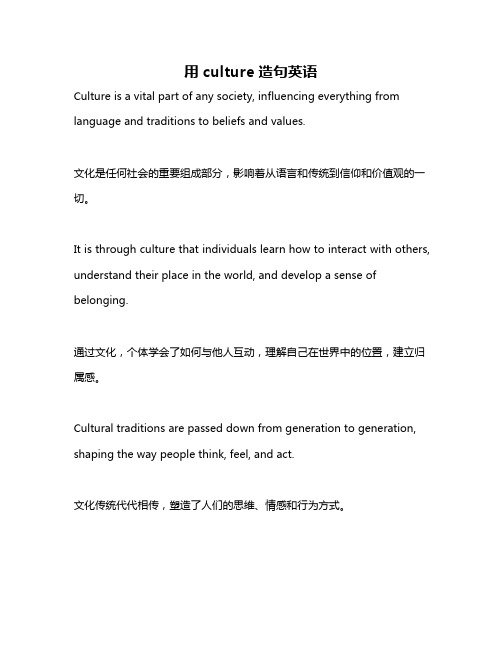
用culture造句英语Culture is a vital part of any society, influencing everything from language and traditions to beliefs and values.文化是任何社会的重要组成部分,影响着从语言和传统到信仰和价值观的一切。
It is through culture that individuals learn how to interact with others, understand their place in the world, and develop a sense of belonging.通过文化,个体学会了如何与他人互动,理解自己在世界中的位置,建立归属感。
Cultural traditions are passed down from generation to generation, shaping the way people think, feel, and act.文化传统代代相传,塑造了人们的思维、情感和行为方式。
In today's globalized world, the exchange of cultures has become more prevalent, leading to a greater appreciation for diversity and a better understanding of different ways of life.在当今全球化的世界中,文化的交流变得更加频繁,促使人们更加重视多样性,并更好地了解不同的生活方式。
Through cultural exchange, individuals can broaden their horizons, develop empathy for others, and foster a greater sense of unity among diverse communities.通过文化交流,个体可以拓宽视野,对他人产生同情,促进多样社区之间更紧密的凝聚力。

cultural的用法-回复Cultural is a word that is commonly used in the context of society and human behavior. It refers to the beliefs, customs, practices, and values shared by a particular group of people. Cultural identity plays a significant role in shaping individual and collective behaviors, as well as shaping the overall social fabric of a community or nation. In this article, we will explore the various uses of the term "cultural" and how it influences our lives.One of the primary uses of the word "cultural" is in relation to cultural diversity. As the world becomes increasingly interconnected, it is crucial to recognize and appreciate the various cultures that coexist. Cultural diversity refers to the existence of multiple cultures within a society or a community. These cultures can differ in terms of language, religion, art, cuisine, and many other aspects. Embracing cultural diversity promotes inclusivity and fosters understanding between people of different backgrounds.Cultural heritage is another aspect that is deeply associated with the term "cultural." It refers to the artifacts, traditions, and practices that are inherited from past generations and are deemed valuable for their historical, artistic, or scientific significance. Culturalheritage can include tangible objects such as historical buildings, artworks, artifacts, as well as intangible elements like oral traditions, performing arts, rituals, and festivals. Preserving cultural heritage is essential for maintaining a sense of identity and connection with the past.Culture also shapes our personal identities and influences our behavior. We often identify ourselves with a particular cultural group, whether it is based on nationality, ethnicity, or shared experiences. These cultural identities provide us with a sense of belonging and social cohesion. They also define our values, beliefs, and attitudes towards various aspects of life, such as family, gender roles, education, and work. Understanding our own cultural identity allows us to relate to others and navigate the complexities of multicultural societies.Cultural practices and traditions play a significant role in shaping our daily lives. These practices, passed down through generations, have a profound impact on our social interactions, celebrations, and even our daily routines. For example, the practice of greeting one another with a handshake or a bow varies across different cultures. Similarly, the celebration of significant events likeweddings, births, or religious festivals can vary greatly from culture to culture. These practices provide a rich tapestry of experiences that contribute to the diversity and vibrancy of our societies.Language is another crucial aspect of culture. It allows us to communicate, express ideas, and transmit knowledge. Language embodies the values and beliefs of a culture, reflecting its unique perspectives and worldview. The preservation and promotion of indigenous languages are vital for safeguarding cultural heritage, as language is intrinsically tied to identity. Language also serves as a bridge between cultures, enabling people from different backgrounds to understand and appreciate one another.In conclusion, the term "cultural" encompasses a wide range of aspects that shape our lives and society. From cultural diversity and heritage to personal and collective identities, cultural influences are pervasive and influential. Embracing cultural diversity and preserving cultural heritage are critical for fostering inclusivity, understanding, and social cohesion. By recognizing and appreciating the value of different cultures, we can build a moreharmonious and interconnected world.。
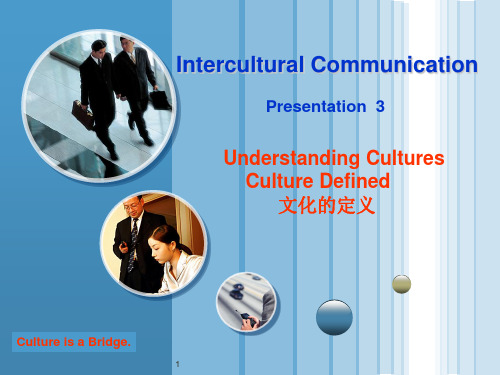

culture cultural作定语区别"Culture" and "cultural" are both related terms that describe different aspects of human society and behavior. While the term "culture" refers to the entire way of life of a particular group of people, "cultural" is an adjective used to describe anything related to culture. In this essay, we will explore the difference between these two terms in more detail.Culture is a complex concept that encompasses all the beliefs, customs, practices, and norms of a particular group of people. It includes the arts, language, religion, values, and social institutions that shape individuals' behavior and worldview. Culture is a dynamic and ever-evolving concept that is passed down from generation to generation and influences the way people think, act, and perceive the world around them.Cultural, on the other hand, is an adjective used to describe anything that is related to a particular culture. It is used to identify and analyze the different elements and manifestations of culture. For example, we can talk about cultural practices, cultural values, or cultural artifacts. By using the term "cultural," we are focusing on the specific aspects of culture that are unique to a particular group or society.One key difference between culture and cultural is that culture is abroader and more inclusive term, while cultural is more specific and limited in scope. Culture refers to the overall way of life of a group of people, encompassing all aspects of their society. It is a comprehensive concept that cannot be easily defined or confined to specific boundaries. On the other hand, cultural is used to describe the specific practices, beliefs, or artifacts that are unique to a particular group or society.Moreover, culture can be both tangible and intangible, whereas cultural is primarily used to describe tangible aspects of culture. Tangible aspects of culture include physical artifacts, such as clothing, tools, and architecture, as well as observable practices, rituals, and traditions. Intangible aspects of culture include beliefs, values, attitudes, and behaviors that cannot be directly observed but shape individuals' actions and interactions. Cultural, however, is primarily used to describe the tangible manifestations of culture, such as cultural practices, cultural artifacts, or cultural heritage.Culture is also a dynamic and ever-changing concept, while cultural is more static and fixed. As societies evolve and interact with one another, their cultures undergo transformations and adaptations. New ideas, technologies, and forms of expression are introduced, leading to changes in cultural practices, values, and beliefs. Culture is thus adynamic and evolving concept that reflects the ongoing interactions and developments within a society. In contrast, cultural is often used to describe specific aspects of culture that are more fixed or traditional. It is used to identify and analyze the unique practices, symbols, or expressions that distinguish one culture from another.In conclusion, culture and cultural are related but distinct terms. Culture refers to the entire way of life of a particular group of people, encompassing all aspects of their society, whereas cultural is an adjective used to describe anything related to culture. Culture is a broader and more comprehensive concept that includes both tangible and intangible elements, while cultural primarily focuses on specific aspects of culture that are unique to a particular group or society. Culture is dynamic and ever-evolving, while cultural is more fixed and traditional. Understanding the difference between these terms is essential for analyzing and appreciating the diverse ways in which human societies express and manifest their values, beliefs, and practices.。
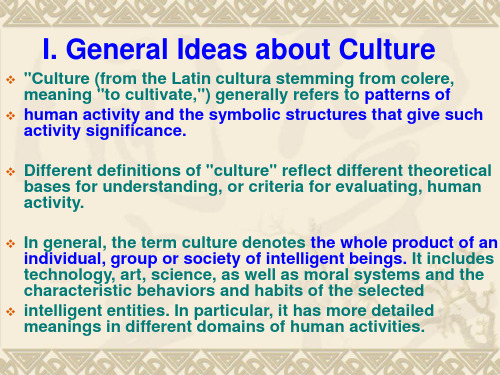


culture造句简单1. This is culture shock. Evidently, at least four essential stages of culture-shock adjustment occur.这就是文化冲击。
很明显,在人们适应文化冲击的过程中至少会出现四个主要阶段。
2. The actual patterns of spreading of the AIDS virus change from culture to culture.艾滋病的实际传播方式又因文化的差异而有所不同。
3. Now you feel comfortable; you have adjusted to the new culture.现在你感到舒服,你已经适应了新的文化。
4. Not only did learning another language teach me the value of hard work, but it also gave me insights into another culture, and my mind was opened to new ways of seeing things.它不仅使我懂得了艰苦努力的意义,而且使我认识了不同的文化,让我以一种全新的思维去看待事物。
5. He teaches in the University of Chinese Culture.他在中国文化大学教书.6. However, when you have completely adjusted to a new culture you can more fully enjoy it.然而,当你完全适应了某一种新的文化时,你会更加充分地喜爱这种文化的。
7. After you deal with your hostile feelings, recognition of the temporary nature of culture shock begins.在你对付过了自己的敌对情绪后,你就会开始认识到文化冲击的短暂性。
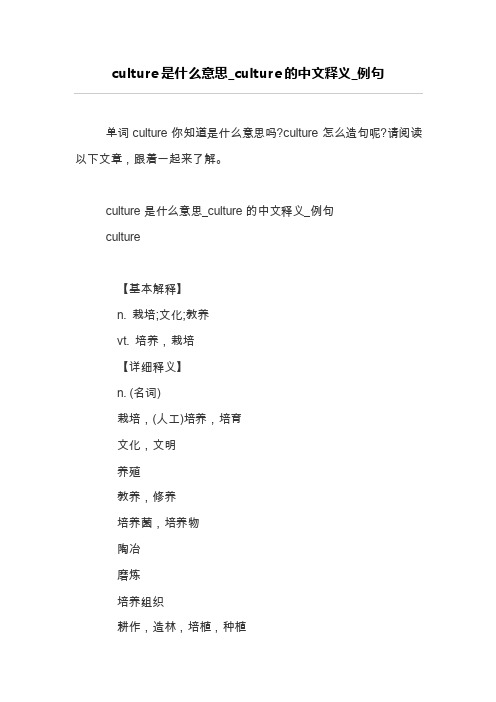
culture是什么意思_culture的中文释义_例句单词culture你知道是什么意思吗?culture怎么造句呢?请阅读以下文章,跟着一起来了解。
culture是什么意思_culture的中文释义_例句culture【基本解释】n. 栽培;文化;教养vt. 培养,栽培【详细释义】n. (名词)栽培,(人工)培养,培育文化,文明养殖教养,修养培养菌,培养物陶冶磨炼培养组织耕作,造林,培植,种植《文化报》v. (动词)养殖培养(细菌),栽培,培植,培育耕种,耕作修养,修习,使有教养磨炼【双解释义】n. (名词)[U][C]文化development of the arts and sciences in society[U]休养,教养; 精神文明; 训练; 教育artistic and other activity of the mind and the works produced by this[U]养殖,培养,栽培the practice of raising animals and growing plants【常用短语】popular culture 流行文化; 大众文化; 通俗文化; 民间文化Primitive culture 原始文化; 原始文化; 原始文明; 上古文化Culture industry 文化工业; 文化产业; 文化工業; 产业文化Islamic culture 伊斯兰文化; 清真文化; 伊斯兰文明; 伊斯兰教文化Majiayao culture 马家窑文化Mississippian culture 密西西比文化Houli culture 后李文化Traditional culture 传统文化; 文化传统; 传统文明; 民族传统文化Vinča culture 温查文明【例句】The greeks built a civilization and culture of their own .希腊人创造了他们自己的文明和文化。
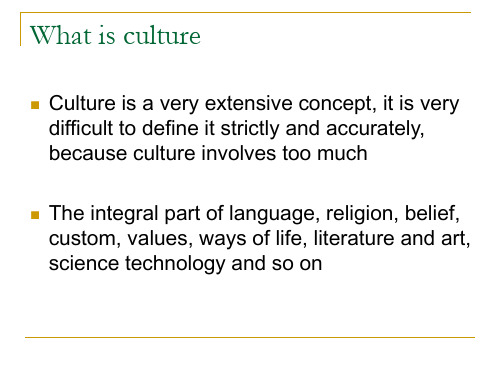

co-culture定义Co-culture是一个由两个词组成的复合词,其中“co”表示“共同”,“culture”表示“文化”。
因此,Co-culture可以理解为共同的文化。
在跨文化交流和社交中,Co-culture是指两个或多个不同文化背景的个体或群体之间共同创造的文化形式。
Co-culture的概念源自于不同文化之间的互动和融合。
在全球化的今天,不同文化之间的接触和交流越来越频繁。
在这个过程中,各种文化之间不仅仅是简单地并存或互相影响,而是共同创造了新的文化形式,即Co-culture。
Co-culture的形成可以通过各种途径实现。
首先,不同文化之间的交流和融合可以通过语言、音乐、艺术、食物等形式来实现。
例如,当不同国家的音乐家合作创作音乐时,他们会将各自的音乐风格和元素融入到作品中,创造出独特的Co-culture音乐。
其次,不同文化之间的交流也可以通过跨国公司、国际组织等机构来实现。
在这些机构中,来自不同国家和文化背景的人们共同工作和生活,他们的行为和观念也会相互影响和融合,形成Co-culture。
Co-culture的形成对于促进文化多样性和文化创新具有重要意义。
通过不同文化之间的交流和融合,人们可以更好地理解和尊重他人的文化,增强文化多样性的认识和认同。
同时,Co-culture也为创新提供了新的机会和资源。
不同文化之间的交流和融合可以激发出新的创意和想法,推动文化的发展和进步。
然而,Co-culture也面临一些挑战和问题。
首先,不同文化之间存在着差异和冲突。
在共同创造新文化的过程中,不同文化背景的个体或群体可能会有不同的期望和需求,这可能导致冲突和分歧。
其次,Co-culture的形成也可能导致文化的同质化和标准化。
当不同文化之间的融合过程过于迅速和深入时,可能会导致部分文化面临被边缘化和消失的风险。
为了促进健康和可持续的Co-culture发展,有几点需要注意。
首先,各方应保持开放和包容的态度,尊重和接纳不同文化背景的个体或群体。

Culture is a complex and multifaceted concept that encompasses the beliefs,customs, arts,and way of life of a particular group of people.It is a reflection of the shared values, practices,and traditions that shape the identity of a society.Here are some key aspects of culture that can be explored in an essay:1.Definition of Culture:Culture can be defined as the collective programming of the mind that distinguishes the members of one group or category of people from another.It includes language,religion,cuisine,social habits,music,and arts.nguage and Communication:Language is a fundamental aspect of culture,serving as a tool for communication and a carrier of cultural identity.It shapes the way people think and express themselves,and it can vary greatly between different cultures.3.Religion and Spirituality:Religion plays a significant role in many cultures, influencing moral codes,rituals,and the understanding of lifes purpose.It can bring communities together and provide a framework for understanding the world.4.Cuisine and Food:Food is not just about sustenance it is a form of cultural expression. Different cuisines reflect the history,geography,and climate of a region,and sharing a meal is often a social and cultural event.5.Arts and Literature:The arts,including visual arts,music,dance,and literature,are vital components of culture.They reflect the creativity and imagination of a society and can serve as historical records of cultural evolution.6.Traditions and Customs:Traditions are practices that are passed down through generations,often linked to religious or cultural events.Customs can include everything from daily rituals to annual festivals.7.Social Norms and Values:Every culture has its own set of social norms and values that guide behavior and interactions.These norms can vary widely and can influence everything from personal relationships to business practices.8.Diversity and Inclusion:Culture is not static it evolves and adapts over time.The exchange of ideas and practices between different cultures can lead to new cultural forms and greater understanding among diverse groups.9.Cultural Heritage and Preservation:Recognizing and preserving cultural heritage is important for maintaining a connection to the past and ensuring that future generations can learn from and appreciate their cultural roots.10.Globalization and Cultural Exchange:In todays interconnected world,cultures are increasingly interacting and influencing each other.This can lead to both the spread of cultural practices and the potential for cultural homogenization.11.Challenges and Opportunities:Cultures face various challenges,such as the loss of traditional knowledge and the impact of external influences.However,these challenges also present opportunities for innovation and the development of a more inclusive global culture.12.Cultural Identity:A persons cultural identity is a significant part of their selfconcept, shaped by their cultural background and experiences.It can influence their sense of belonging and their place in the world.In an essay about culture,its essential to explore these themes in depth,providing examples and discussing the implications of cultural practices and beliefs on individuals and societies.。

culture英文定义Culture is a complex and multifaceted concept that encompasses the shared beliefs, values, traditions, customs, and behaviors of a particular group of people. It is the foundation upon which individuals and societies build their identities and ways of life. Culture is not static but rather a dynamic and ever-evolving phenomenon that is influenced by various factors, including geography, history, politics, and technology.At its core, culture is the collective expression of a group's shared experiences, knowledge, and worldviews. It is the lens through which individuals perceive and interact with the world around them. Culture shapes our understanding of ourselves, our relationships with others, and our place in the larger social and global context.One of the most fundamental aspects of culture is language. Language is the primary means of communication and serves as a vehicle for the transmission of cultural knowledge and values. It not only facilitates the exchange of ideas but also reflects the unique perspectives and nuances of a particular cultural group. Language is not merely a tool for conveying information; it is a living, breathing entity that evolves over time and is deeply intertwined with thecultural identity of its speakers.Another crucial element of culture is the arts, which encompass a wide range of creative expressions, such as music, dance, literature, visual arts, and architecture. These artistic endeavors not only reflect the cultural heritage of a group but also serve as a means of preserving and transmitting that heritage to future generations. The arts are often used to tell stories, convey emotions, and explore the human experience, providing a window into the cultural values and beliefs of a particular society.Religion and spirituality also play a significant role in shaping culture. Beliefs, rituals, and practices associated with various religious and spiritual traditions often form the foundation of a culture's worldview and moral framework. These belief systems can influence everything from social structures and gender roles to artistic expression and dietary customs.In addition to language, arts, and religion, culture is also manifested in the daily customs and traditions of a group. These can include everything from the way people dress, the foods they eat, the celebrations they observe, and the social etiquette they follow. These cultural practices not only reflect the shared identity of a group but also serve to reinforce and perpetuate its values and norms.One of the most fascinating aspects of culture is its diversity. Around the world, there is an incredible array of cultural traditions, each with its unique history, beliefs, and practices. This diversity is a testament to the richness and complexity of the human experience. At the same time, the increasing interconnectedness of the global community has led to the exchange and blending of cultural elements, giving rise to new and hybrid forms of cultural expression.While cultural diversity is a source of strength and vitality, it can also lead to challenges and conflicts. Differences in beliefs, values, and customs can sometimes create misunderstandings and tensions between individuals and groups. However, it is precisely these differences that make cultural exchange and understanding so important. By embracing and celebrating the diversity of cultures, we can gain a deeper appreciation for the human experience and foster greater empathy, tolerance, and cooperation among people from all walks of life.In conclusion, culture is a multifaceted and dynamic concept that is essential to the human experience. It shapes our individual and collective identities, influences our perceptions and behaviors, and serves as a lens through which we interpret the world around us. By understanding and appreciating the diversity of cultures, we can foster greater cross-cultural understanding, promote social harmony, and enrich our own lives and those of others.。

culture造句:1.We are all to a great extent the products of our culture.我们在很大程度上都是本土文化的产物2.Death is one of the great taboos in our culture.在我们的文化中,“死亡”是一大忌。
3.Venice is a beautiful city full of culture and history.威尼斯是一座具有深厚文化和历史底蕴的美丽城市。
4.The political cultures of the United States and Europe are very different.美国的政治观和欧洲的大不相同。
5.A culture of failure exists in some schools.在某些学校中存在着失败文化。
6.This tradition has no parallel in our culture.这种传统在我们的文化中是没有的。
7.We are living in a consumer culture.我们生活在一种消费文化之中。
8.Immigrants have contributed to British culture in many ways.移民在许多方面都对英国文化有所贡献。
9.White has always been a symbol of purity in Western cultures.在西方文化中,白色一向象征纯洁。
10.They spent a month steeping themselves in Chinese culture.他们花了一个月时间潜心钻研中国文化。
11.We want to expose the kids to as much art and culture as possible.我们想让孩子们受到尽可能多的艺术和文化熏陶。
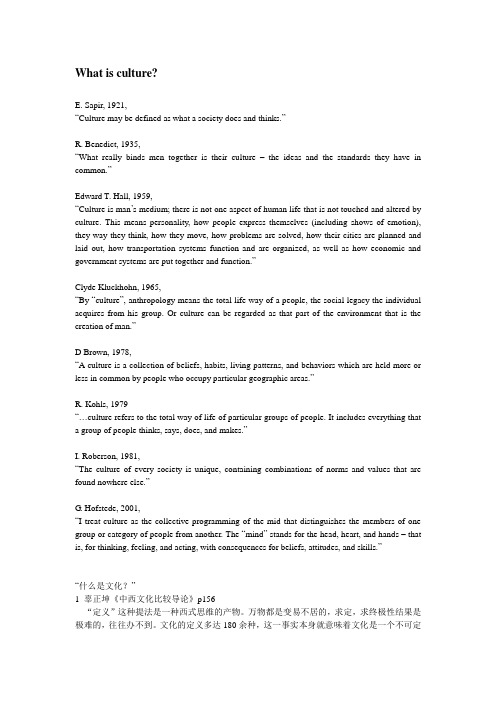
What is culture?E. Sapir, 1921,“Culture may be defined as what a society does and thinks.”R. Benedict, 1935,“What really binds men together is their culture –the ideas and the standards they have in common.”Edward T. Hall, 1959,“Culture is man’s medium; there is not one aspect of human life that is not touched and altered by culture. This means personality, how people express themselves (including shows of emotion), they way they think, how they move, how problems are solved, how their cities are planned and laid out, how transportation systems function and are organized, as well as how economic and government systems are put together and function.”Clyde Kluckhohn, 1965,“By “culture”, anthropology means the total life way of a people, the social legacy the individual acquires from his group. Or culture can be regarded as that part of the environment that is the creation of man.”D Brown, 1978,“A culture is a collection of beliefs, habits, living patterns, and behaviors which are held more or less in common by people who occupy particular geographic areas.”R. Kohls, 1979“…culture refers to the total way of life of particular groups of people. It includes everything that a group of people thinks, says, does, and makes.”I. Roberson, 1981,“The culture of every society is unique, containing combinations of norms and values that are found nowhere else.”G. Hofstede, 2001,“I treat culture as the collective programming of the mid that distinguishes the members of one group or category of people from another. The “mind” stands for the head, heart, and hands – that is, for thinking, feeling, and acting, with consequences for beliefs, attitudes, and skills.”“什么是文化?”1 辜正坤《中西文化比较导论》p156“定义”这种提法是一种西式思维的产物。

关于culture雅思口语话题解读culture,文化。
这是一个经久不衰的考题,下面小编就给大家分享一些关于culture雅思口语话题解读,仅供参考。
雅思口语话题cultureA foreign cultureOk, well one of the foreign cultures I’m most interested in at the moment is American culture, so that’s what I’ve decided to talk about.And as for what I know about it, well if I’m gonna be totally honest with you, I really don’t know that much, mainly because I haven’t yet been to the States, so I’m no expert in any sense of the word, but one thing I think is fair to say is that Americans really love sports, especially basketball and baseball. And I’ve also heard that, apparently, universities in America offer a lot of sports scholarships, so I think this goes to show that being good at sport is pretty highly-regarded over there, and is a strong part of their culture.So that’s one thing, and I think I’m also right in saying that rap and hip hop are very popular kinds of music in the States, because I’ve noticed that in a lot of Hollywood films I’ve watched, this type of music seems to appear quite a lot, although I have to admit that I find it really difficult to understand what exactly is being said or sung in the songs!But anyway, with regard to why I find the American culture interesting, well firstly, I guess one reason would be that it’s completely different to our culture over here, and that’s kind of what makes it so appealing to know more about. I mean, just to give you one example, the way food’s cooked in America, on the whole, is a lot different to here, as over there they tend to usean oven for most of their cooking, whereas here in China, we tend to fry most of our food. And as well as this, I think another thing that makes the American culture interesting is the fact that it encompasses so many things that I wasn’t aware of before, so learning about it has really broadened my mind.And this, I would say, is the beauty of learning other cultures, because for me at least, making an effort to understand a little bit about U.S. culture has definitely given me a wider perspective on life.So yeah, that’s pretty much all I’ve got to say, so thanks for listening.雅思口语P3话题:文化Culture考官?:What is 'culture' for you?考生?: Culture can be defined as the way of life of a particular society or section of society. It involves their customs and traditions, and so in some senses culture is what distinguishes us from others, what makes us unique. I think culture is also what connects us to our past,to our heritage. We mustn't forget modern culture either, though. Youth culture is often very vibrant and powerful, with its new and inventive forms of music, dress and art.剑桥雅思口语加分表达:be defined as 被定义为customs and traditions 习俗和传统in some senses 在一定意义上distinguish 区分connect someone to 把...和...联系起来vibrant 有活力的powerful 有力量的inventive 创新的考官?:Do you think that it is important for a society or culture to have a sense of continuity with the past?考生?: Yes, definitely. Change is necessary, but it is also frightening. For this reason, people continue to rely on their traditions to give them a sense of their roots and to remind them of where they've come from. Commemorating the past is also a way of bringing people closer together, such as during National Day.剑桥雅思口语加分表达:frightening 恐怖的continue to 继续做某事rely on 依赖a sense of their roots 一种根基感remind someone of ...让某人想起commemorate the past 纪念过去bring poeple closer together 拉近人们之间的距离解读雅思口语话题——“A Cultural Event in China”研究中心分析认为,在雅思口语考试中,关于文化、传统的话题一直以来都是考官常问的题目,而面对这样的问题,考生往往都怀有“既爱又恨”的感情。
Culture
Europe is a long history of the area, here gave birth to a lot of economic and cultural power. Europe there are dozens of countries, speak ten languages, countries have their own cultural tradition. But the cultural sources, mainly is the ancient Greek culture and Christian culture, they in the long history of rheology in conflict and complementary fusion trend. They contains the "people" concept, through the medieval Christian culture to the later of the European culture has produced profound influence. They pay attention to the human spirit and rational essence, emphasize the original reason to limit, and in this foundation forms a pursuit of spiritual freedom, humanism, rational and democratic national cultural tradition.
American culture, in a sense, is the extension of European culture, because the American language, population composition and her national spirit are all originated from Europe. On the other hand, the U.S. and European culture with different, because European settlers in North America continent drive away the indians, in a barren desert land created marveled at the splendid civilization, can be said that the American culture is the European culture inheritance and change. America is a nation of immigrants, it ancestors came from all over the world, people moved to the United States, not only in the geographical position move it, but also their country's appraisal and custom brought to the new residence; As time passes, American culture formed a higher degree of KuanRongXing, the heterogeneous culture and different appraisal the tolerance, acceptable attitude. At this point, American society feasible custom than any other country in the world to more broad.
The simple summary of the characteristics of the Europe and the United States.
The European people the pursuit of spiritual freedom, rational and democratic. European cultural characteristics as follows:
The pursuit of spiritual freedom, advocate humanism, emphasize the rational and scientific, the pursuit of modern science and technology is the cradle of civilization.
While americans cherish the most basic values is individualism and depend on yourself, equal opportunity and fair competition, material comforts, and hard work. American culture characteristics as follows: emphasis on independent, individual character and not reject others, adventure, pioneering and innovative spirit, freedom, equality spirit, pragmatism. , the United States culture is material
Politic
After the second world war, the world center moved to the United States. Western Europe became fading and weak because of two wars. First world war the United States had been anglo-french footman. After the first world war the United States was rising. Then the United States start Marshall plan, which provided billions of dollars in aid for the reconstruction of European economies.After the second world war, the United States to become the world the overlord. The method become a footman. The reason of changes is the American national strength strong. Western Europe weak strength.
But then established the European Community. Hope to come on America's control. Enlightenment is. Science and technology is the first productive force. Military strength is stronger. The strong economic strength. Science and technology is strong. To have in the world of his status。